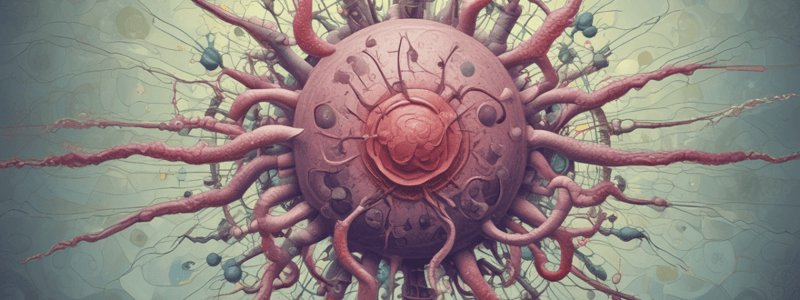Podcast
Questions and Answers
What does LD50 stand for in microbiology?
What does LD50 stand for in microbiology?
- Low Dose 50
- Long Duration 50
- Lethal Dose 50 (correct)
- Large Dose 50
Which of the following is an example of ID50?
Which of the following is an example of ID50?
- Vibrio cholerae
- 100,000,000 cells
- 108 spores
- 5,000 to 10,000 spores (correct)
How do pathogens primarily gain entrance into the body through the skin?
How do pathogens primarily gain entrance into the body through the skin?
- Inhalation through the skin
- Through hair follicles and sweat glands (correct)
- By binding to skin cells
- Via pores
What do pathogens use to attach to host tissue?
What do pathogens use to attach to host tissue?
Which feature plays a crucial role in tissue tropism?
Which feature plays a crucial role in tissue tropism?
What does ID50 represent in microbiology?
What does ID50 represent in microbiology?
What is the main difference between a pandemic and an epidemic disease?
What is the main difference between a pandemic and an epidemic disease?
What is the term for the ability of a microbe to cause disease?
What is the term for the ability of a microbe to cause disease?
What type of disease is normally found in a certain percentage of a population?
What type of disease is normally found in a certain percentage of a population?
What is the term for the degree of pathogenicity?
What is the term for the degree of pathogenicity?
What are the factors produced by a microorganism that induce pathology in a host?
What are the factors produced by a microorganism that induce pathology in a host?
What is a disease condition caused by the presence or growth of infectious microorganisms or parasites?
What is a disease condition caused by the presence or growth of infectious microorganisms or parasites?
What is the defining characteristic of an opportunistic pathogen?
What is the defining characteristic of an opportunistic pathogen?
What is the difference between pathogenicity and virulence?
What is the difference between pathogenicity and virulence?
What is the difference between an epidemic and a pandemic?
What is the difference between an epidemic and a pandemic?
What is the difference between an endemic and an epidemic disease?
What is the difference between an endemic and an epidemic disease?
Which of the following best describes the relationship between an obligate pathogen and its host?
Which of the following best describes the relationship between an obligate pathogen and its host?
Flashcards are hidden until you start studying




